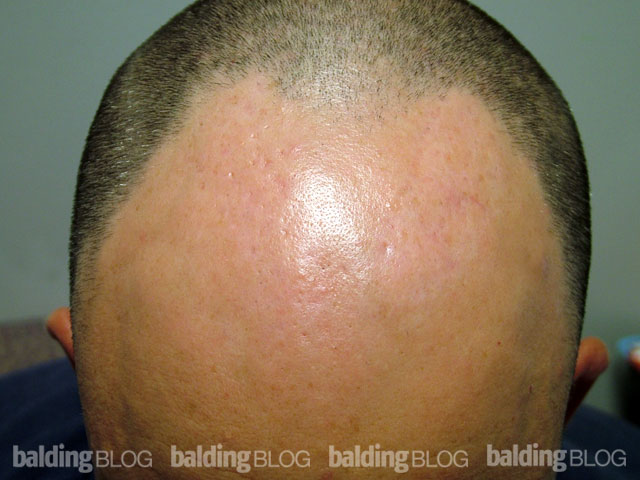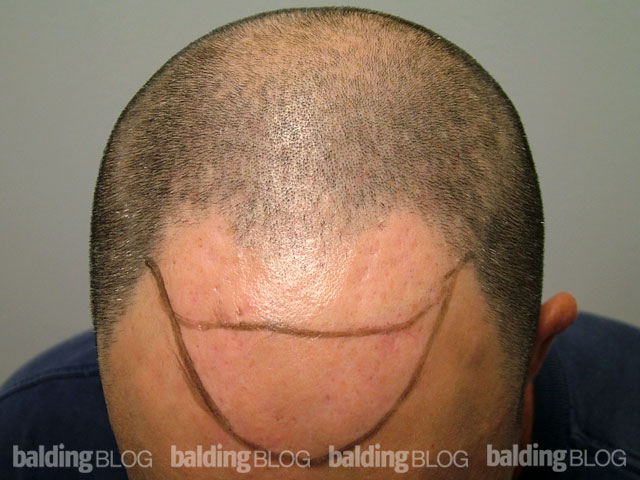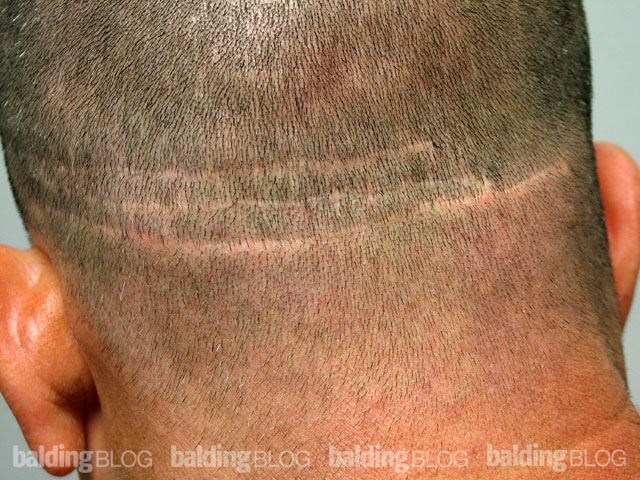This patient came into my office yesterday and was committed to keeping his hair short to 1/8 inch length. He had plug hair transplants (certainly not at NHI) 13 years ago. It was complicated by complete loss of all residual hair in the front from shock hair loss and it was a shock to him as well, because he had some hair in the front of his head before the transplant was done. Today, he would have used Propecia to protect against shock loss and there would be no plugs there.
He started on a quest to go back to a clean slate and become a man with frontal balding. He told me that he had 12 laser hair removal procedure for about $10,000, and he had two dermabrasian procedures to the skin surface with a laser to try to get rid of the pits in the skin and the cobblestoning of the scalp surface (a few thousand dollars more). The hair removal was spread over years of treatment (although he lost all evidence of hair that may have still been left in the area), and his skin became smooth with a changed color (lost its pigmentation), leaving him with a skin color and texture difference between the area treated and the rest of his scalp. His real costs reflect the bad transplant (about $10,000 in 1994-1995), plus his time and his pain of living with a look that made him selfconscious. We did get into a discussion that maybe, if he knew that his results would be normal, he might try a transplant, but I suggested to him that considering his long road to become bald again, he should complete what he started before going at it again. The middle picture reflected wshere he might actually put hair if he got transplants, but I suggested that he should not go the transplant route at this time. Actually, I thought that he looked reasonably good, considering what he had and what he went through… except for the scars in the back of his head and the long time getter where he wanted to be.
He came to see me because:
- He has three awful scars in the high neck that he would like me to treat and fix (see photo below)
- He wanted to know what he could do about the skin color abnormalities
The scars are best treated with Follicular Unit Extraction (FUE) and can probably be subdued in one or two FUE procedures (there is no linear scar with this procedure as each hair follicular unit is removed one at a time). There is nothing I can do about the skin changes from the multiple laser treatments, but he might seek out the opinion of a dermatologist that transplants pigment into skin that lacks pigmentation. I suggested that he go on Propecia for his crown loss with the possibility that this hair may come back with this drug. The pictures below show a pink color to the area where the laser treatment were, but he tells me that when the pink color goes away, it becomes progressively more whitish.
I thought I would share this patient’s saga, with his permission of course. If he had come to see me before this all started. The process to fix it with today’s technology would have been faster and slicker, but that is another story I will tell later (they say pictures are worth 1000 words and the photogalary on our webstie newhair.com shows many people similar to this patient solved the problem by getting the old plugs hidden with normal looking hair, a less expensive and much faster process from start to finish). Here are this man’s photos — click to enlarge.









 It sounds like you experienced shock loss and if this is in the miniaturized hair, the hair may not come back. Treating thinning with transplants is not something I do often. In many people with miniaturized hair, transplanting into that ‘unhealthy’ hair does little to really increase the fullness. I believe that for most people like you, any benefit you will get in the long term may be lost in the short term, making transplants a poor decision. I would think that Propecia should have been used in advance of your hair transplant procedure just to minimize this risk. The transplants done may offset the hair loss and the Propecia may bring some of the hair back. Only time will tell. Once the glass of milk falls and the milk spills out, it may be impossible to bring it back.
It sounds like you experienced shock loss and if this is in the miniaturized hair, the hair may not come back. Treating thinning with transplants is not something I do often. In many people with miniaturized hair, transplanting into that ‘unhealthy’ hair does little to really increase the fullness. I believe that for most people like you, any benefit you will get in the long term may be lost in the short term, making transplants a poor decision. I would think that Propecia should have been used in advance of your hair transplant procedure just to minimize this risk. The transplants done may offset the hair loss and the Propecia may bring some of the hair back. Only time will tell. Once the glass of milk falls and the milk spills out, it may be impossible to bring it back.